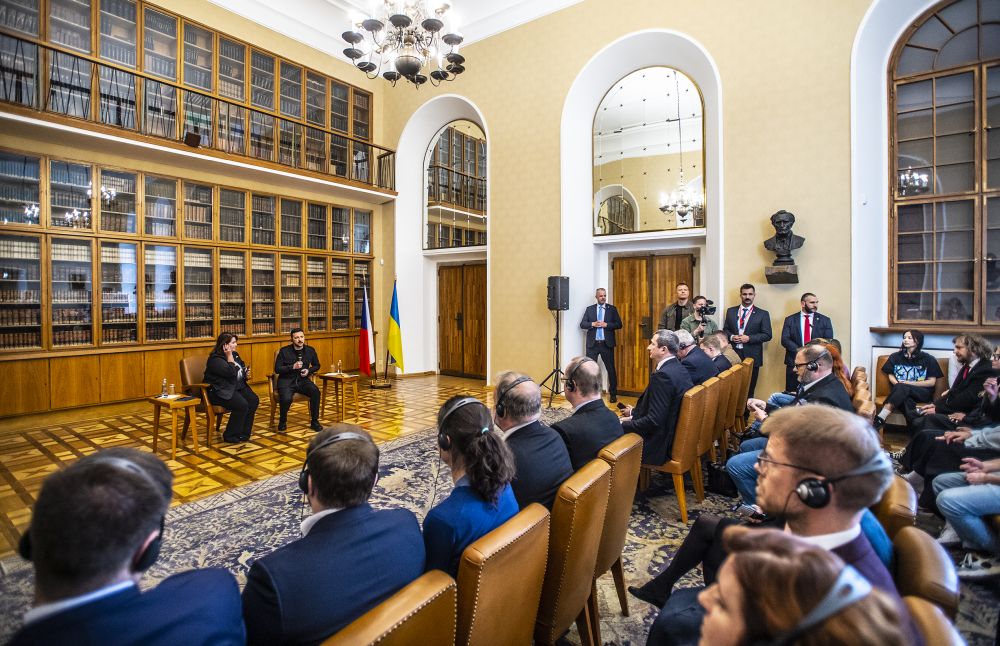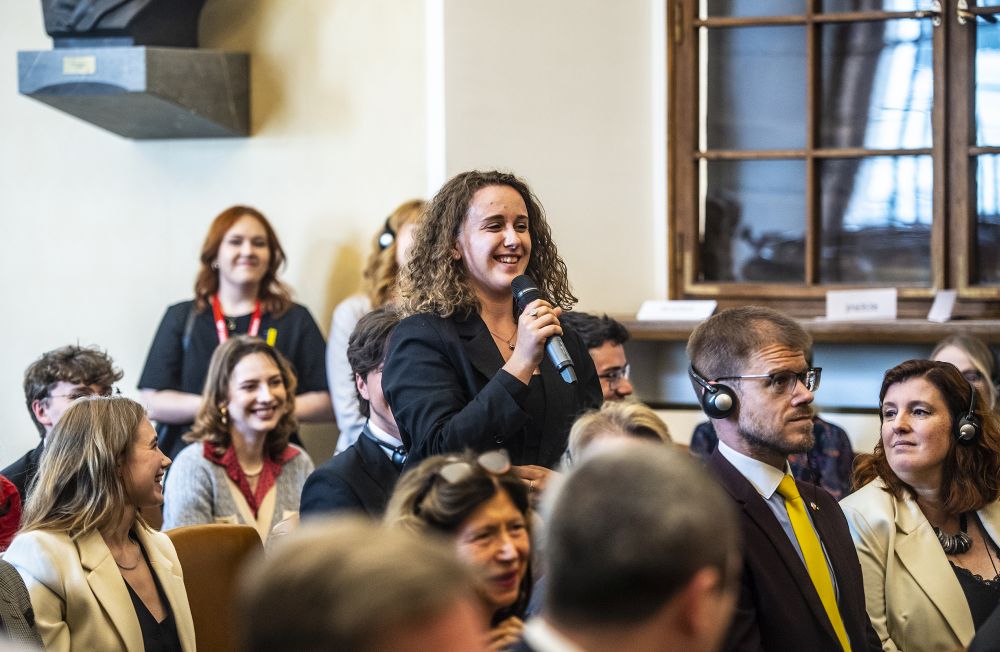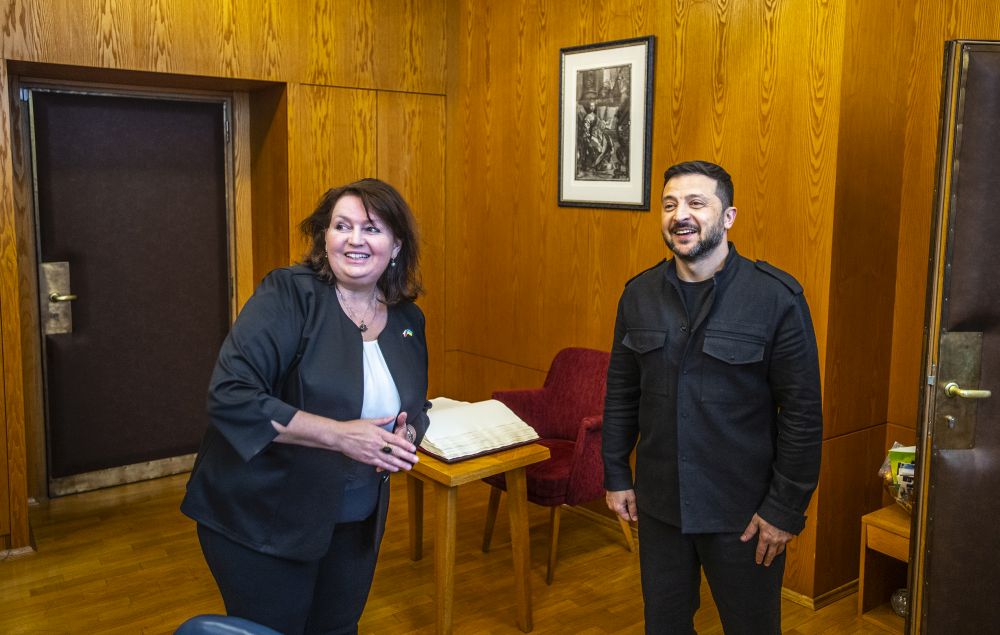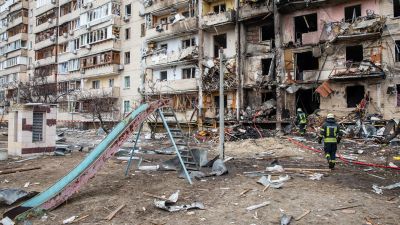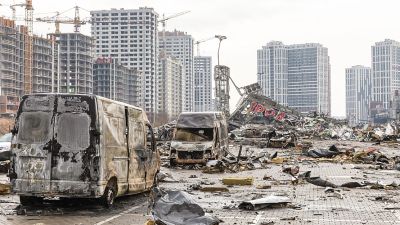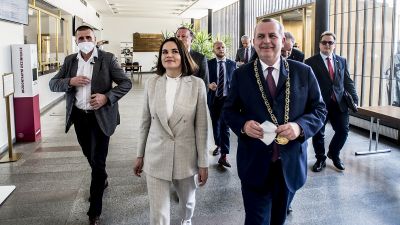During his full programme in the Czech Republic, Ukrainian President Volodymyr Zelenskyy found time to visit Charles University. On site, he took part in an important discussion with students, moderated by the rector of Charles University, Milena Králíčková. A range of topics, including the opportunities for graduates to contribute to Ukraine’s post-war reconstruction, was discussed. The closely-watched event took place in the Patriotic Hall in CU's historic Carolinum building.
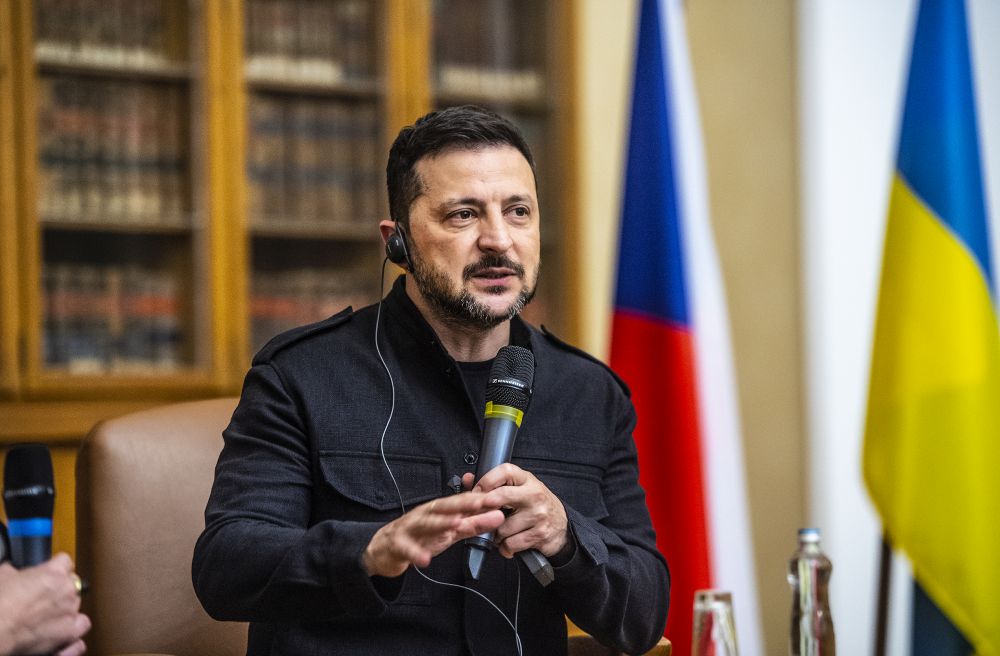
Ukraine's President Volodymyr Zelenskyy in discussion with students and academics in the Patriotic Hall at Charles University on 5 May 2025.
From the earliest days of the brutal Russian invasion of Ukraine, which began on 24 February 2022, Charles University extended a helping hand to those fleeing the war. Both students and academics from Ukraine found refuge at the university when the conflict made it impossible for them to continue their studies or work at home. At present, CU hosts 957 Ukrainian students and 64 Ukrainian academic staff. The university has provided financial support as well as other assistance, including psychological services and educational seminars on social support, legal residency, and language training.
Several dozen of those students had the opportunity to meet President Volodymyr Zelenskyy in person during his visit. In the Carolinum, he emphasised the importance of skilled human resources for the future rebuilding of Ukraine when the war ends – expertise that can be gained, for example, through study at Charles University. Students took part in a dynamic discussion with the president, asking how they might find roles in their country’s future.
| Since the outbreak of war, Charles University has maintained a dedicated online section called Charles University for Ukraine, offering up-to-date and useful information in Czech, Ukrainian and English. |
“I am absolutely convinced that rebuilding Ukraine will not depend solely on professions linked to construction. When we speak of reconstruction, we are also talking about mental health, science, education, and many other fields. That is why there will be a wide demand for various professions. Every European country has an interest in a strong Ukraine because, due to its geographical position, Ukraine is defending the whole of Europe. Therefore, investment will come not only from EU states but also from the United Kingdom and the United States. These countries will support and strengthen Ukraine, and wages will rise as a result. Although I am aware that reconstruction may take many years, I am absolutely certain that each of you will find a place and a role in Ukraine – if that is what you want,” President Zelenskyy said. He added that no one would be forced to return to Ukraine. Rather, his aim is to create conditions in the country so appealing that Ukrainians will want to return after their studies and contribute to the country’s post-war recovery.
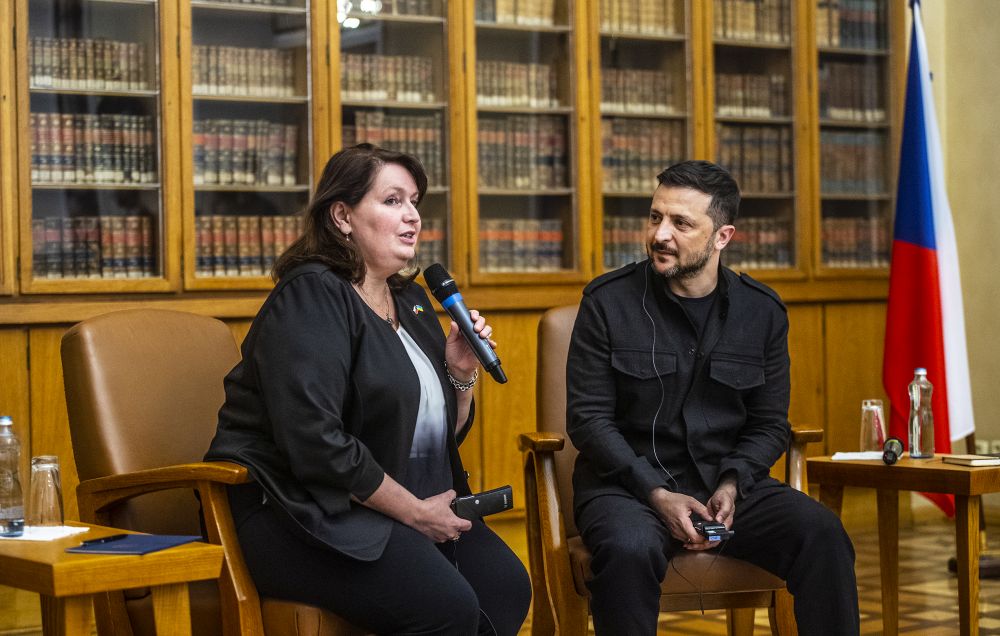
CU's Milena Králíčková moderated the discussion with the Ukrainian president; he outlined hopes for the rebuilding of post-war Ukraine.
Students asked how Ukrainian leaders intended to secure support from a future Czech government that will only emerge from the upcoming autumn parliamentary elections (given that poll leaders ANO have long indicated a potenrial policy shift). “Czechs have a historical memory of Soviet tanks, passed down through generations. They understand the meaning of freedom. It doesn’t matter what political party you belong to – if you care about your country’s security, you’ll want Ukraine to be strong. It’s a pragmatic choice. The longer Ukraine can resist and prevent Russia from advancing, the safer life will be for you, your friends, your family, and your children. I don’t believe there is any such thing as opposition to security. I can’t predict the situation in October – those are your elections – but I do believe it’s essential not to choose Russia’s side in this war. What matters is that both our countries remain independent, and that Europe remains strong,” the president stressed.
President Zelenskyy also shared his deep and longstanding connection with the Czech Republic, recalling fond memories of his past visits with his family. “When I think back to my visits to the Czech Republic, I remember them being filled with light – regardless of the season – and that light came from the people here. You have wonderful architecture and an impressive history. I’ve visited many museums here, but your people are what matters most. I’m glad that the values of Ukrainians and Czechs are the same – that’s what we’re fighting for. I believe the courage of both Ukrainians and Czechs will save this world and defeat the evil unleashed by Vladimir Putin – or by whoever else may follow in his path,” he said.
Rector Králíčková thanked President Zelenskyy and paid tribute to the brave people of Ukraine in their fight for freedom and democracy. “Whenever your path brings you to the Czech Republic, the doors of this university will always be open to you. I trust that our students – both Czech and Ukrainian – will welcome you with the same enthusiasm and interest we’ve witnessed today,” she said.
She also highlighted the university’s appreciation for its cooperation with Ukrainian academic institutions and said that meetings such as this served as an inspiration for the entire academic community and reinforce the university’s commitment to promoting international understanding.
Among the audience of several dozen was Darja, originally from Kharkiv, a student of international relations and political science at the Faculty of Social Sciences, where she studied before the war. She came to the Czech Republic shortly after the Russian invasion, which severely affected her hometown. “I’m very glad I had the chance to speak directly with the president today and to represent fellow Ukrainians living here. I’m a member of the university group Generation for Ukraine, which helps Ukrainian students – and not only them – integrate into Czech society. Another topic I would like to speak with him about in the future is the prejudice held by some people who remained in Ukraine towards those who fled. I’d also love to ask him someday how he manages to cope with everything. He is a brave and incredibly hard-working man who is constantly under enormous pressure. I’d be really interested to know what psychological strategies he uses to stay calm and keep going,” she reflected.
The Ukrainian delegation’s working visit to the Czech Republic focused heavily on developing educational, scientific, and cultural cooperation between the two countries, as well as supporting Ukrainian studies. Earlier in the day, Rector Milena Králíčková met with the First Lady of Ukraine, Olena Zelenska, to discuss exactly those themes. Eva Lehečková, Dean of the Faculty of Arts at Charles University, and Ukrainian studies expert Tereza Chlaňová from the Institute of East European Studies signed a memorandum of cooperation with the President of Ukraine’s Foundation for the Support of Education, Science and Sport. Through this, the Faculty of Arts joined the Global Coalition for Ukrainian Studies, which aims to connect similarly focused educational institutions.
In fact, as early as 2022, Charles University was instrumental in founding the Eastern Partnership University Cluster, a consortium of universities from EU and Eastern Partnership countries, including several Ukrainian universities. Its mission is to strengthen mutual cooperation in science, research, and education across Europe – from east to west.
Ukrainian President Volodymyr Zelenskyy, along with his wife Olena and a large delegation, has been visiting the Czech Republic since Sunday, 4 May. Over the course of two intensive working days, he met with Czech President Petr Pavel, Prime Minister Petr Fiala, Senate leader Miloš Vystrčil, and other political leaders. This is President Zelenskyy’s second visit to Prague since the start of war in 2022, his first having taken place in 2023.


